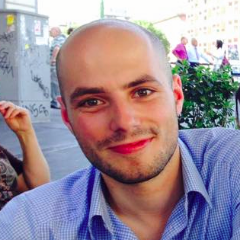Mozart's The Magic Flute is is not easy to get right. Its multiple themes and mix of narrative-musical styles requires difficult decisions from directors when deciding where to invest their energies. Are they to focus on the vaudeville-style fun, the Enlightenment philosophical reflections, the narrative's fairytale elements or its dark undercurrents? Graham Vick's new production for the Macerata Opera Festival aims to do all of the above, and the result is an original conception that finds creative means to engage with the audience. Ultimately, however, this production lacks focus.
It has been a barnstorming 2017/18 season for Vick in Italy, who in new productions of Stiffelio and La bohème has succeeded in making these works feel acutely contemporary and relevant. In attempting to do the same with The Magic Flute, the director has returned to many of his favourite tropes. He sets the action against a backdrop of the struggles of the mass populace against the powers that be. A hundred Macerata residents, as well as immigrants residing in the city, have been enlisted as extras, recalling Vick's work with the Birmingham Opera Group, and play placard-wielding protestors seen both onstage and on the flanks in makeshift camps formed from tents and cars. Vick uses the Sferisterio's cavernous space inventively in a bid to immerse the audience in the action. When actors planted in the stalls shout encouragement to Tamino and Papageno during their trials we have the sense of the action taking place all around us. The audience is more directly involved when asked to sing the chorus to Sarastro's aria “O Isis und Osiris”.
Most radically, Vick has collaborated with Fedele d'Amico and Stefano Simone Pintor on a translation of the libretto into plain modern-day Italian. The new text has the immediacy and liveliness of pantomime and feels especially well-suited to expressing the dialogues' bawdier content. Vick makes the most of new opportunities for wordplay so that when the priests grant Papageno not a glass of wine but a joint, his aria “Ein Mädchen oder Weibchen” references the divine properties of cannabis.
The Magic Flute's roots in popular theatre come through most strongly throughout Vick's production, which sparkles with a wealth of witty detail. Tamino, first seen on a building site, is attacked by a digger rather than the customary serpent (his opening aria is sung from within its closed bucket). The three ladies that rush to save him wear hard hats and high visibility vests, transforming into seductresses after noting his beauty as they strip to reveal glam dresses below. Papageno is reimagined as a fried chicken delivery man, and the three child spirits –mischievous sprites who zoom around onstage on motorbikes – are fun.
But treatment of the work's philosophical undercurrents doesn't work nearly as well. Vick's is a generalised representation of the power of politics, business and religion, the three of which are represented with two-dimensional models of the ECB, Apple's headquarters and St Peter's Basilica. The director never clearly defines what the protestors are fighting against, nor how the captured Pamina fits into the wider story of civil strife. Obscure symbolism, including a large statue of the Madonna with tape over her mouth, muddies the drama further and even Vick's typically powerful use of gritty detail tends to feel gratuitous (for example with Pamina threatening to self harm during her lament). By failing to root such elements into the narrative this production sometimes feels like a parade of Vick's favourite cliches.
But strong performances from this young cast did ensure overall enjoyment. Guido Loconsolo's characterful Papageno brimmed with happy-go-lucky charm as he stumbled his way through Sarastro's trials. Valentina Mastrangelo has a rich, interesting voice and sang beautifully as Pamina. Tatiana Zhuravel (The Queen of the Night) impressed with her bright tone and in "Der Hölle Rache" had the top Fs well under her belt. Giovanni Sala was a heartfelt Tamino, and Antonio Di Matteo a solid Sarastro. Less impressive was Daniel Cohen's dull and rather flaccid interpretation of the score.
Closing the work with fireworks set off from the top of the Sferisterio's stage said it all. The production provides plenty of interesting detail, but never gets under the surface as it would like to.
James' press trip was funded by Macerata Opera Festival




